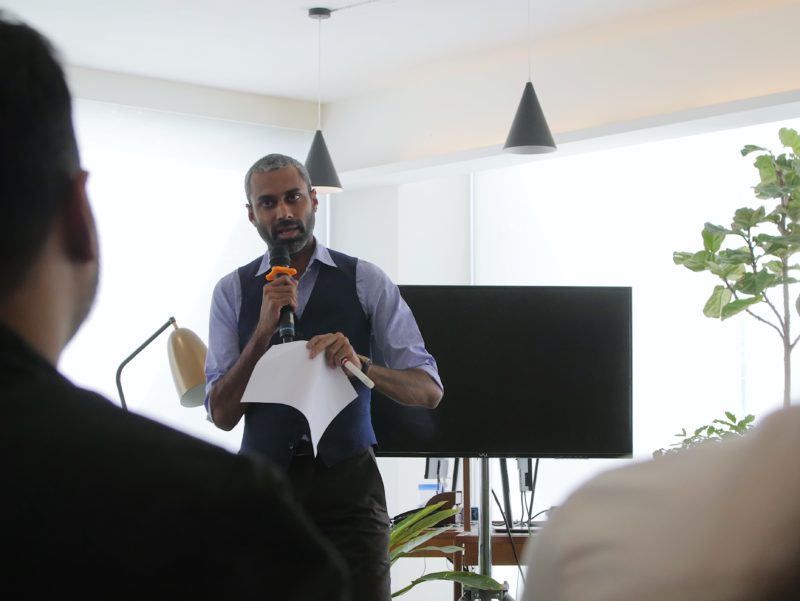Day 2 of Extreme Entrepreneurs (EE) kicked off with Extreme Simulations. During these sessions, the entrepreneurs are put on the spot to handle real (start-up) life problems which they might face in their path to building great companies. The idea is to help young entrepreneurs with some tips and tricks on how to avoid some of these issues and be better prepared when these simulations come to life.
While the theme for first week was “Handling tough conversation with board member”, led by Dev Khare from Lightspeed, this week the teams faced the heat of handling a co-founder conflict.
Paul Graham, founder of Y Combinator mentioned, “Fights between founders are surprisingly common. About 20% of the start-ups we’ve funded have had a founder leave.” We also spoke to Anu Hariharan, Partner at Y Combinator, as part of Lightspeed EE and she considers founder conflict as one of the two reason of why startups fail; the other being lack of product / market fit.
Our second Extreme Simulation case study “The Disappearing founder” decoded behaviours that lead to smouldering fights between co-founders and the eventual face-offs.
Our case – Ravi (Business development), Aruna and Amit (tech brains) of a food delivery start-up “Gozo” (fictional, of course). Ravi had pushed the other co-founders to take a B2B pivot in the last 6 months. Aruna and Amit, unhappy with the pivot were working behind Ravi’s back to create a B2C AI based tool and were already taking meetings with customers and investors.
Our setting – we gave all the start-ups some prep time and we put 3 leads from all different teams to become one of the characters and take charge. They were then put inside our “hot” room to debate and come to a conclusion. Talking points and guidance was provided by Hemant inside the room while the non-participating founders were outside the room, viewing and listening to the simulation. The idea was to pressure-test our teams but also come out with a valuable lesson. The other teams were asked to make notes and comment on how they would’ve reacted or felt what could’ve been better.


We’ve captured key learnings on how some of these co-founder conflicts can be avoided and handled better as shared by Hemant Mohapatra from Lightspeed who led the session:
Avoid avoiding conflicts
It is important to acknowledge that conflict is normal but needs to be maintained at a healthy level. The risks of having too little conflict is a sign of avoidance whereas too much conflict will kill the startup. Running a start-up is like managing a marriage; defensiveness, criticism, contempt and stonewalling are four horsemen of its failure.
Be mission driven
A lot of founders tend to become ego-driven when things go south. It is important for co-founders to keep the focus on the mission of the company and constantly remind themselves and communicate with each other that the ultimate aim is bigger than the individuals.
Avoid dead-end / subjective lines of arguments
Avoid line of arguments that are over-focused on topics such as “my idea is better”, “but I work harder than you”, or cliffhangers like “if we don’t do this, I’ll quit”. No one ever wins these arguments and you lose both time and mutual respect.
Invest in each other
Invite on-going criticism about what you may be doing that your co-workers do not like. A good way to initiate this is to ask “name one thing about me that really ticks you off!” In order to make this work, it is imperative to commit to a safe space and build the trust which pushes the co-workers to be honest with each other.
Trust your gut
Don’t start a company with a person just because it is convenient to do so. Trust your gut on whether he/she is the right one to start the journey with.
Get help
When the damage is beyond control, don’t drag it further and get a neutral third party (common friend, executive coach, investor etc.) who can be a great sounding board.
Establish boundaries
Conflicts can arise when there is no clear demarcation on decision making. Find what are the pillars of success for your company and assign names to each of them. It is healthy to debate when key decisions are taken but trust and commit to the final course of action picked by the assigned co-founder.
Find your “Time out” phrase
If things get too combative find your “time out” phrase, which basically means to timeout from the on-going disagreements and instead align on how to prove/disprove the hypothesis and move forward. Hemant recalls when he was at Google, their time out phrase was “show me the data”.



We hope you found the takeaways useful. To stay updated, follow EE on twitter here and the official Lightspeed India handle here


Helps. Thanks
Fantastic…